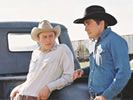Eye For Film >> Movies >> Brokeback Mountain (2004) Film Review
There's something about mountains, the way they inspire us, fill us with hopes and dreams. Is there anyone who hasn't stood at the foot of a mountain as a child and not imagined climbing it? Lush green valleys seem to promise happiness and the hills beyond are aspirations, symbols of a soaring spirit and the challenges by which we measure ourselves.
Set in the verdant pastures and breathtaking scenery of Wyoming, Brokeback Mountain is a symbol of an enduring dream, a happiness that might be out of reach, of lakes and sunsets, of campfires and sheep farming, of flickering flames and a life away from the hustle bustle, where a can of beans and fresh coffee span a deeper range of existence than the materialism of the city and where a person can get in touch with his soul.

Our story starts with two men taken on as sheepherders in 1963, regular guys who need a job. One of them is planning to be married. They become fast friends but soon discover more about themselves than they were prepared for - and far more than the local community can live with.
Jack Twist (Jake Gyllenhaal) and Ennis Del Mar (Heath Ledger) divide the work between them, one sleeping on the land to protect the sheep overnight and the other riding back and forth with supplies. So far the film has blended the idyllic lifestyle of Westerns with a slightly more modern setting, reminiscent of early Marlboro cigarette advertising. What follows is a brief scene that explodes and causes many people to either be shocked (especially fundamentalist Americans apparently), or simply say, "Not the sort of subject matter that interests me."
As there is no way of avoiding the information by way of the advance publicity, it makes no sense not to tell you that the two men have sex with each other. But, for once, do believe the reports that have given this movie outstanding acclaim worldwide and go to see it, not because it happens to include a couple of gay cowboys, but because it is a monumental film in itself.
The Romeo & Juliet plot - two star-crossed lovers from different social groups kept apart by family prejudice - has been almost exhausted. The not dissimilar star-crossed couple here are kept apart by social prejudice alone - extreme homophobia that includes gruesome torture and murder, although these details, thankfully, are hinted at rather than conveyed too graphically.
What is fascinating is the way the people in their lives deal with it. The wife, who knows but pretends it isn't happening, the other wife who lies, the children who grow up presumably in the dark, but still attached to their loving father, and the parents whose tender acceptance, in spite of the upset they probably feel at the knowledge, quietly putting their son's happiness first. While covering the extreme stereotypes of prejudice, director Ang Lee (Sense And Sensibility, Crouching Tiger, Hidden Dragon) has wisely avoided simplistic reactions from the supporting characters. The finely nuanced performances allow us to see many sides of the moral dilemma without once making judgements.
Breaking stereotypes is the order of the day for the two lead characters, who enjoy much of the macho rough and tumble associated with the heterosexual male, especially the whip-cracking Texan, or full-bloodied Australian. European, Asian and Latin American men seem to find less need for such demonstrations to assert themselves, perhaps because homosexuality is better integrated and respected in these cultures.
Neither Jack nor Ennis are particularly camp and both would be identified as straight on a casual glance. ("You know, I'm not queer!" says one, the morning after - "Me neither!" the other replies.) This must be particularly annoying to American cultures that cling to such outdoor archetypes as "heterosexual".
Lee, an outsider in America, has bravely represented a minority that still carries more social stigma than colour, much to the shame of a country that claims to be the greatest in the world. An even bigger achievement is that he has done it in a mainstream movie and one that may well be remembered as a cinematic landmark.
When the sheep season ends, the two men continue with their separate lives, but meet up four years later - the phrase "goin' fishing" may never be the same again. They realise the hopelessness of their situation but cannot bring themselves to discard it either. When one of the wives spots them in a brief and covert embrace, we know that disaster looms, the only mystery being what form it will take.
The movie unfolds with incredible grandeur amid the torn-apart emotions of all those involved, condensing a story of a considerable number of years without ever rushing it. Perhaps the sole weakness is that it never tries to advance our understanding directly and none of the characters are particularly blameless role models, but in confining itself to telling a story it reaches out for understanding better than any claim to moral high ground.
The cinematography is remarkable, juxtaposing awe-inspiring images in a way that conveys a deep sincerity for the subject matter. There are mountains to climb and others that represent ideals to work towards, or simply molehills that seem like mountains until we open our eyes and conquer our fears about different lifestyles.
The journey to Brokeback could be the small step to a better understanding of our humanity.
Reviewed on: 18 Jan 2006



















